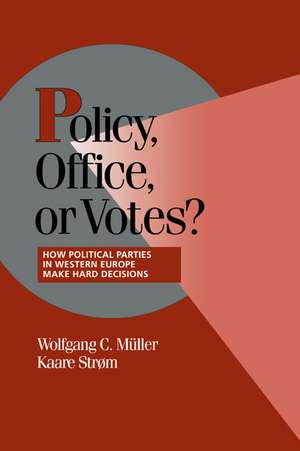Policy, Office, or Votes?: How Political Parties in Western Europe Make Hard Decisions: Cambridge Studies in Comparative Politics
Editat de Wolfgang C. Müller, Kaare Strømen Limba Engleză Paperback – 27 aug 1999
| Toate formatele și edițiile | Preț | Express |
|---|---|---|
| Paperback (1) | 251.44 lei 6-8 săpt. | |
| Cambridge University Press – 27 aug 1999 | 251.44 lei 6-8 săpt. | |
| Hardback (1) | 576.66 lei 6-8 săpt. | |
| Cambridge University Press – 27 aug 1999 | 576.66 lei 6-8 săpt. |
Din seria Cambridge Studies in Comparative Politics
-
 Preț: 233.13 lei
Preț: 233.13 lei -
 Preț: 267.61 lei
Preț: 267.61 lei -
 Preț: 239.36 lei
Preț: 239.36 lei -
 Preț: 185.64 lei
Preț: 185.64 lei -
 Preț: 160.82 lei
Preț: 160.82 lei -
 Preț: 206.52 lei
Preț: 206.52 lei - 9%
 Preț: 594.68 lei
Preț: 594.68 lei -
 Preț: 225.70 lei
Preț: 225.70 lei -
 Preț: 164.94 lei
Preț: 164.94 lei -
 Preț: 206.71 lei
Preț: 206.71 lei -
 Preț: 236.42 lei
Preț: 236.42 lei -
 Preț: 358.38 lei
Preț: 358.38 lei -
 Preț: 231.82 lei
Preț: 231.82 lei -
 Preț: 257.82 lei
Preț: 257.82 lei -
 Preț: 264.74 lei
Preț: 264.74 lei -
 Preț: 269.58 lei
Preț: 269.58 lei -
 Preț: 201.24 lei
Preț: 201.24 lei -
 Preț: 232.45 lei
Preț: 232.45 lei -
 Preț: 203.42 lei
Preț: 203.42 lei -
 Preț: 191.12 lei
Preț: 191.12 lei -
 Preț: 158.77 lei
Preț: 158.77 lei -
 Preț: 199.05 lei
Preț: 199.05 lei -
 Preț: 288.80 lei
Preț: 288.80 lei -
 Preț: 388.29 lei
Preț: 388.29 lei -
 Preț: 288.04 lei
Preț: 288.04 lei - 11%
 Preț: 695.06 lei
Preț: 695.06 lei - 11%
 Preț: 553.80 lei
Preț: 553.80 lei -
 Preț: 262.06 lei
Preț: 262.06 lei - 11%
 Preț: 691.66 lei
Preț: 691.66 lei -
 Preț: 228.00 lei
Preț: 228.00 lei -
 Preț: 385.28 lei
Preț: 385.28 lei -
 Preț: 312.89 lei
Preț: 312.89 lei -
 Preț: 224.44 lei
Preț: 224.44 lei -
 Preț: 287.07 lei
Preț: 287.07 lei -
 Preț: 251.27 lei
Preț: 251.27 lei -
 Preț: 313.70 lei
Preț: 313.70 lei -
 Preț: 277.38 lei
Preț: 277.38 lei -
 Preț: 423.79 lei
Preț: 423.79 lei - 11%
 Preț: 552.94 lei
Preț: 552.94 lei - 11%
 Preț: 554.43 lei
Preț: 554.43 lei - 14%
 Preț: 783.26 lei
Preț: 783.26 lei - 11%
 Preț: 584.04 lei
Preț: 584.04 lei -
 Preț: 228.60 lei
Preț: 228.60 lei
Preț: 251.44 lei
Nou
Puncte Express: 377
Preț estimativ în valută:
48.12€ • 50.05$ • 39.73£
48.12€ • 50.05$ • 39.73£
Carte tipărită la comandă
Livrare economică 15-29 aprilie
Preluare comenzi: 021 569.72.76
Specificații
ISBN-13: 9780521637237
ISBN-10: 0521637236
Pagini: 336
Ilustrații: 10 b/w illus. 24 tables
Dimensiuni: 153 x 229 x 24 mm
Greutate: 0.46 kg
Ediția:New.
Editura: Cambridge University Press
Colecția Cambridge University Press
Seria Cambridge Studies in Comparative Politics
Locul publicării:New York, United States
ISBN-10: 0521637236
Pagini: 336
Ilustrații: 10 b/w illus. 24 tables
Dimensiuni: 153 x 229 x 24 mm
Greutate: 0.46 kg
Ediția:New.
Editura: Cambridge University Press
Colecția Cambridge University Press
Seria Cambridge Studies in Comparative Politics
Locul publicării:New York, United States
Cuprins
Figures; Tables; Contributors; 1. Political parties and hard choices Kaare Strøm and Wolfgang C. Müller; 2. Office, votes and then policy: hard choices for political parties in the Republic of Ireland, 1981–1992 Michael Marsh and Paul Mitchell; 3. Party behaviour and the formation of minority coalition governments: Danish experiences from the 1970s and 1980s Jørgen Elklit; 4. From policy-seeking to office-seeking: the metamorphosis of the Spanish Socialist Workers Party Donald Share; 5. Changing strategies: the dilemma of the Dutch Labour Party Ron Hillebrand and Galen A. Irwin; 6. Party behaviour in a polarized system: the Italian Communist Party and the historic compromise Roberto D'Alimonte; 7. Decision for opposition: the Austrian Socialist Party's abandonment of government participation in 1966 Wolfgang C. Müller; 8. Leadership accountability and bargaining failure in Norway: the Presthus debacle Kaare Strøm; 9. Winner takes all: the FDP in 1982–1983: maximizing votes, office and policy? Thomas Poguntke; 10. Trade-offs in Swedish constitutional design: the monarchy under challenge Torbjörn Bergman; 11. Parliamentary rules and party behaviour during minority government in France John D. Huber; 12. Conclusions: party behaviour and representative democracy Wolfgang C. Müller and Kaare Strøm; Index.
Recenzii
"...This book demonstrates that the notions of parties as seekers of office,votes,or policy can enhance understanding of these democratic organizations. This volume is highly recomended to enrich collections on comparative politics."
"The main virtues of this book are...the astute way in which the editors have identified a theoretically important matter that requires a preliminary empirical survey and the professionalism with which the authors of the case studies have set about their tasks. This is...essential reading for those who have ambitions to build more complex models of party competition. It is also an attractive supplementary text for those teaching courses on party competition." Michael Laver, Political Science Review
"The main virtues of this book are...the astute way in which the editors have identified a theoretically important matter that requires a preliminary empirical survey and the professionalism with which the authors of the case studies have set about their tasks. This is...essential reading for those who have ambitions to build more complex models of party competition. It is also an attractive supplementary text for those teaching courses on party competition." Michael Laver, Political Science Review
Descriere
This book examines the behaviour of political parties in situations where they experience conflict between two or more important objectives.


















